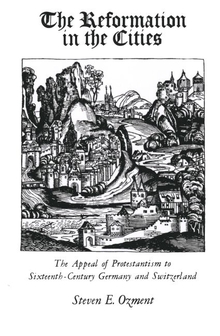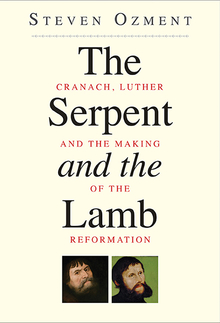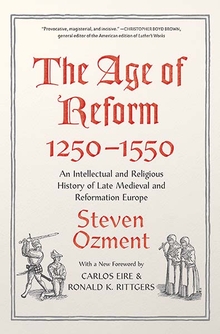The Reformation in the Cities
WARNING
You are viewing an older version of the Yalebooks website. Please visit out new website with more updated information and a better user experience: https://www.yalebooks.com
The Appeal of Protestantism to Sixteenth-Century Germany and Switzerland
Steven Ozment
“A bold synthesis of intellectual and social history which explains the appeal of Protestantism to the German and Swiss cities, the media of its communication, and the means of its establishment.”—Religious Studies Review
“This book is a stimulating addition to the recent work in urban history, and it offers a new and thought-provoking perspective on the teachings and appeal of early Protestantism.”—History
“Ozment very masterfully combines the history of ideas and social history in a work of exacting scholarship and persuasive argumentation. It will no doubt become a seminal work in its field.”—The Annals
“This fine study is a pleasure to read, shows an excellent understanding of the late medieval scene, and presents convincing evidence that magistrates and city council leaders were not the ‘motors of reform’ in the cities of Germany and Switzerland…. There is nothing in print in English that is comparable.”—Choice
“A work of unusual interest and value. . . . Essential reading for all students of the Reformation.”—New Review of Books and Religion
“This book is a stimulating addition to the recent work in urban history, and it offers a new and thought-provoking perspective on the teachings and appeal of early Protestantism.”—History
“Ozment very masterfully combines the history of ideas and social history in a work of exacting scholarship and persuasive argumentation. It will no doubt become a seminal work in its field.”—The Annals
“This fine study is a pleasure to read, shows an excellent understanding of the late medieval scene, and presents convincing evidence that magistrates and city council leaders were not the ‘motors of reform’ in the cities of Germany and Switzerland…. There is nothing in print in English that is comparable.”—Choice
“A work of unusual interest and value. . . . Essential reading for all students of the Reformation.”—New Review of Books and Religion
“A bold synthesis of intellectual and social history which explains the appeal of Protestantism to the German and Swiss cities, the media of its communication, and the means of its establishment.”—Religious Studies Review
“This book is a stimulating addition to the recent work in urban history, and it offers a new and thought-provoking perspective on the teachings and appeal of early Protestantism.”—History
“Ozment very masterfully combines the history of ideas and social history in a work of exacting scholarship and persuasive argumentation. It will no doubt become a seminal work in its field.”—The Annals
“This fine study is a pleasure to read, shows an excellent understanding of the late medieval scene, and presents convincing evidence that magistrates and city council leaders were not the ‘motors of reform’ in the cities of Germany and Switzerland. . . . There is nothing in print in English that is comparable.”—Choice
“A work of unusual interest and value. . . . Essential reading for all students of the Reformation.”—Review of Books and Religion
"Ozment has written a bold, exciting, and extraordinarily useful book. . . . He has, in this work explained more satisfactorily and more profoundly than anyone has yet succeeded in doing the attraction of Protestantism to townsmen, the manner in which it was communicated to them, and the process by which it was established in towns. . . . Ozment's scholarship is obviously massive and thorough and yet carried with remarkable confidence and lightness of touch."—William J. Bouwsma
"Ozment begins by sketching the trends in Reformation research. . . . The author then explores the religious attitudes of the lay people on the eve of the Reformation, conveys the different ways in which the original Protestant message was heard by them, and finally deals with the process by which it was enacted in the cities. His arguments are supported by citations from primary sources, utilizing both Catholic and Protestant popular literature of the period such as catechisms, tracts, manuals, and drama. This well-researched and well-organized volume . . . makes a significant contribution to the debate concerning the spread of the Reformation."—Library Journal
"This remarkable book by Professor Ozment helps explain much of the appeal which Protestantism had for wide segments of society in sixteenth-century Germany and Switzerland. By thorough documentation Professor Ozment shows that the burdens of medieval religion were widely resented by intellectuals, artisans, magistrates, and ordinary workers. They welcomed Protestantism for the respectable theological and practical relief it offered. . . . When Protestant orthodoxy hardened, many people later saw little difference between the burdens of Protestantism and those of Roman Catholicism."—Catholic Historical Review
"Ozment is concerned with the significant problem of the appeal of the Reformation to the German-speaking urban laity. He raises a number of important questions including the question of why people choose to become Protestants. To find answers he turns to an examination of some of the popular, religious literature of the day—catechisms, dramas, manuals, poems, pamphlets, and tracts. . . . Ozment's conclusion is that the Reformation offered the laity a new piety, which liberated men and women from the guilt and burdensome practices imposed by the Catholic Church. . . . A scholar of great talent and potential who has made a useful contribution to the literature. . . . A helpful step forward which will be read and enjoyed by many students of the sixteenth century."—The Sixteenth Century Journal
"[Ozment] successfully captures some of the basic reasons for the urban acceptance of the Protestant message in the sixteenth century. . . . As a spark for further discussion and study, the book is outstanding. As a programmatic essay for anyone interested in the relationship between the message of the theologian and the response of society, it is certainly worthwhile."—Journal of the American Academy of Religion
"With massive scholarship, masterly powers of analysis and magisterial though flowing style, Ozment sets out to re-examine our understanding of the religious issues involved in the Reformation at a popular level. . . . a major achievement."—Times Literary Supplement
"Warmly recommended . . . to all serious students of the Reformation."—Review of Books and Religion
"Ozment has written a masterly and concise account of the liberating experience of Protestantism. He vividly re-creates the sense of opportunity and choice which aroused men in the 1520s and 1530s. In emphasizing the Reformation as an experience of individual and communal liberation and enlightenment, his account necessarily sees the development of reformed church disciplines and authority as a backsliding and perhaps neglects earlier aspirations in the same direction."—Times Higher Educational Supplement
"Skillfully using the popular religious literature of the period—vernacular confessional manuals, lay catechisms, tracts, verse, and drama—Ozment develops the thesis that late medieval religion had become a terrible psychological burden for the laity. . . . A welcome addition to the literature on the Reformation, especially for those interested in history 'from the bottom up.'"—South Atlantic Urban Studies
"Ozment[s basic thesis is clearly put and highly persuasive. . . . [His] explanations for the enormous and immediate appeal of a few major Protestant themes—such as their attack on the ritual of the confessional, on the excessive and costly rites for the dead, or on the hypocrisies of clerical celibay—are the core of the book: a very slid core indeed."—E. William Monter, The Historian
"Professor Ozment's pen has provided us here with a competent and provocative statement on the question [of] 'why so many people thought they wanted to be Protestants.' . . . The book gives evidence of extensive familiarity with the relevant primary and secondary sources."—Hans J. Hillerbrand, Renaissance Quarterly
ISBN: 9780300024968
Publication Date: September 10, 1980
Publication Date: September 10, 1980
248 pages, 5 1/2 x 8 1/4




